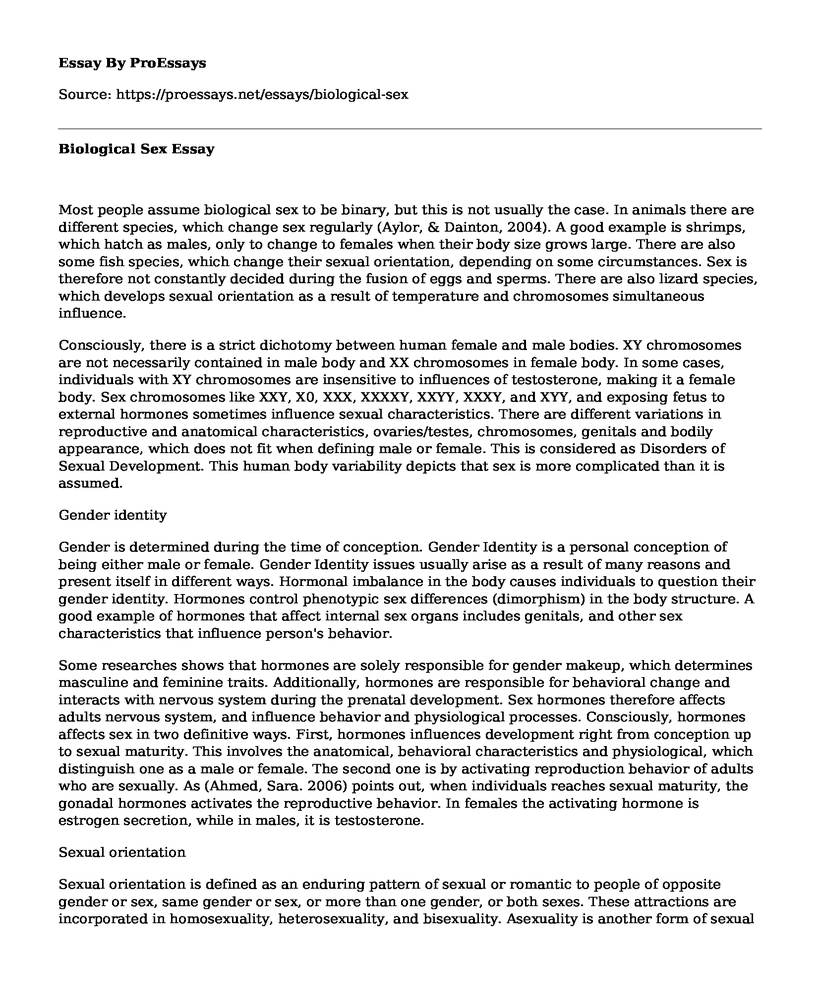Most people assume biological sex to be binary, but this is not usually the case. In animals there are different species, which change sex regularly (Aylor, & Dainton, 2004). A good example is shrimps, which hatch as males, only to change to females when their body size grows large. There are also some fish species, which change their sexual orientation, depending on some circumstances. Sex is therefore not constantly decided during the fusion of eggs and sperms. There are also lizard species, which develops sexual orientation as a result of temperature and chromosomes simultaneous influence.
Consciously, there is a strict dichotomy between human female and male bodies. XY chromosomes are not necessarily contained in male body and XX chromosomes in female body. In some cases, individuals with XY chromosomes are insensitive to influences of testosterone, making it a female body. Sex chromosomes like XXY, X0, XXX, XXXXY, XXYY, XXXY, and XYY, and exposing fetus to external hormones sometimes influence sexual characteristics. There are different variations in reproductive and anatomical characteristics, ovaries/testes, chromosomes, genitals and bodily appearance, which does not fit when defining male or female. This is considered as Disorders of Sexual Development. This human body variability depicts that sex is more complicated than it is assumed.
Gender identity
Gender is determined during the time of conception. Gender Identity is a personal conception of being either male or female. Gender Identity issues usually arise as a result of many reasons and present itself in different ways. Hormonal imbalance in the body causes individuals to question their gender identity. Hormones control phenotypic sex differences (dimorphism) in the body structure. A good example of hormones that affect internal sex organs includes genitals, and other sex characteristics that influence person's behavior.
Some researches shows that hormones are solely responsible for gender makeup, which determines masculine and feminine traits. Additionally, hormones are responsible for behavioral change and interacts with nervous system during the prenatal development. Sex hormones therefore affects adults nervous system, and influence behavior and physiological processes. Consciously, hormones affects sex in two definitive ways. First, hormones influences development right from conception up to sexual maturity. This involves the anatomical, behavioral characteristics and physiological, which distinguish one as a male or female. The second one is by activating reproduction behavior of adults who are sexually. As (Ahmed, Sara. 2006) points out, when individuals reaches sexual maturity, the gonadal hormones activates the reproductive behavior. In females the activating hormone is estrogen secretion, while in males, it is testosterone.
Sexual orientation
Sexual orientation is defined as an enduring pattern of sexual or romantic to people of opposite gender or sex, same gender or sex, or more than one gender, or both sexes. These attractions are incorporated in homosexuality, heterosexuality, and bisexuality. Asexuality is another form of sexual orientation, which is usually identified as the fourth category (Ahmed, Sara. 2006).
Heterosexual (straight).
These are people who are physically and romantically attracted to the members of the opposite sex. Females are attracted to males and males are attracted to their male counterparts. Heterosexual orientations is also known as straight.
Homosexual (gays and lesbians).
Homosexuals are usually physically and romantically attracted to the people of their sex. Males are attracted to their fellow males, while female are attracted to other females. Both female and male homosexuals are referred to as gay. Homosexual females are also known as lesbians.
Bisexual.
Bisexual people are physically and romantically attracted to the members of both sexes. They are Heterosexual and homosexual at the same time.
Asexuality
This is a group of people who are not attracted to any group. They are neither Heterosexual nor homosexual.
Being either Heterosexual, bisexual or homosexual, is not mostly choice of people, and it is hard for them to change. Just like Heterosexuals, homosexuals Asexual and bisexual are represented across ethnic backgrounds, social and economic groups, and in all nationalities (Money, & Ehrhardt, 1972).
There has been no clear understanding of what determines the sexual orientation in people, but it is likely to be explained by a various genetic and biological factors.
Despite the misconceptions and myths, there is no existing evidence that homosexuality comes as a result of parenting styles, early childhood experiences, or the way people are raised. Efforts to change homosexual to Heterosexual have been proven futile and sometimes harmful. Mental health professionals do not advocate to changing of people sexual orientation.
Conclusion
There are both biological and cultural deterministic of sex and gender. Many gender researchers have complicated distinctions between nature/culture, and gender/sex. Irrespective of some feminists views especially on transgender identities, there is no overlap between gender identity and biological sex and on the other hand, gender is not a direct effect of biological sex. Combination of environmental and biological influences produce the gender identity. Bio psychologists usually face challenges when identifying and proving the most important roles of the factors play and their contributions and influences on individuals.
References
Ahmed, Sara. (2006) Queer phenomenology: Orientations, objects, others. Duke University Press,
Aylor, B., & Dainton, M. (2004). Biological sex and psychological gender as predictors of routine and strategic relational maintenance. Sex Roles, 50(9-10), 689-697.
Money, J., & Ehrhardt, A. A. (1972). Man and woman, boy and girl: Differentiation and dimorphism of gender identity from conception to maturity.
Cite this page
Biological Sex. (2021, Mar 04). Retrieved from https://proessays.net/essays/biological-sex
If you are the original author of this essay and no longer wish to have it published on the ProEssays website, please click below to request its removal:
- Essay on Similarities and Differences between Theme in the Hunger Games and the Societal View
- Narrative Essay on Education and Mental Health
- Research Paper on Diverse Learning Communities
- Leasehold Estate: Rights & Responsibilities of Tenants & Landlords - Essay Sample
- Essay Example on Stress: The Primary Emotion That Controls Our Lives
- Paper Example on CDC's ADHD Info: A Rhetorical Analysis
- Free Report Example on Ethical Dilemmas in Healthcare: Challenges and Solutions







